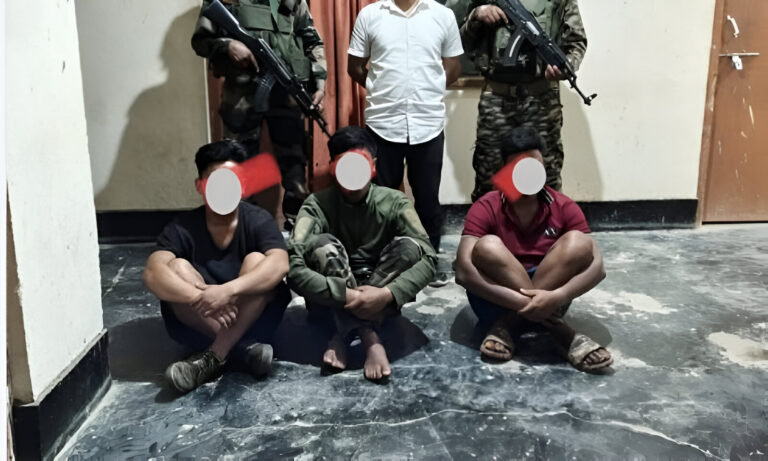Manipur Security Forces Arrest Four Militants in Separate Operations
In a series of coordinated operations, Manipur’s security forces have apprehended four militants associated with various proscribed outfits in the Imphal Valley.
Summary of Recent Arrests
On March 14, 2025, Manipur police conducted separate operations leading to the arrest of four militants linked to different banned organizations operating in the Imphal Valley. These arrests underscore the ongoing efforts of security forces to maintain peace and stability in the region.
Detailed Account of the Operations
H1: Introduction
Manipur, a state nestled in the northeastern part of India, has long been a focal point of ethnic diversity and cultural richness. However, alongside its vibrant heritage, the state has grappled with insurgency and militant activities that have posed significant challenges to its peace and development. The recent arrests of four militants in separate operations by the state’s security forces highlight the persistent efforts to curb insurgent activities and restore normalcy.
H2: The Context of Insurgency in Manipur
To comprehend the significance of these arrests, it’s essential to delve into the backdrop of insurgency in Manipur. The state has been a hotspot for various militant groups, each with distinct ideologies and objectives. These groups often exploit ethnic divisions and grievances, leading to prolonged periods of unrest. The porous international border with Myanmar further complicates the security scenario, facilitating the movement of insurgents and illegal arms.
H2: The Recent Operations Unveiled
The recent operations conducted by Manipur’s security forces were marked by precision and strategic planning. Each arrest sheds light on the intricate network of militant activities in the region.
H3: Arrest of Thokchom Ongbi Anita Devi
In the heart of Imphal West district, at Sagolband Sayang Kurao Makhong, security personnel apprehended 46-year-old Thokchom Ongbi Anita Devi. Identified as a member of the People’s Liberation Army (PLA), her arrest was a significant breakthrough. The PLA, not to be confused with China’s military, is a proscribed militant outfit in Manipur, known for its secessionist agenda. The operation led to the seizure of a pistol with a magazine, 33 live rounds, five SIM cards, and six mobile phones, indicating her active involvement in insurgent activities.
H3: Apprehension of Moirangtham Ricky Singh
Near the India-Myanmar border in Tengnoupal district, 22-year-old Moirangtham Ricky Singh was arrested. Hailing from Khurai Chairenthong in Imphal East district, Ricky Singh is associated with the United National Liberation Front (UNLF-K), another banned organization. His arrest near the border underscores the challenges posed by cross-border insurgency and the exploitation of porous boundaries by militant groups.
H3: Other Notable Arrests
In addition to the above, two other militants were captured in these operations. While their identities were not disclosed, their affiliations with valley-based proscribed outfits highlight the widespread network of insurgent groups in Manipur. The operations also led to the recovery of arms, ammunition, and incriminating documents, further disrupting the operational capabilities of these groups.
H2: The Implications of These Arrests
The successful apprehension of these militants carries profound implications for Manipur’s security landscape. Firstly, it delivers a strong message to insurgent groups about the unwavering commitment of security forces to uphold law and order. Secondly, the seizures made during these operations can provide invaluable intelligence, potentially leading to further crackdowns on militant networks. Lastly, these arrests may bolster public confidence in the state’s efforts to combat insurgency, encouraging greater cooperation between civilians and law enforcement agencies.
H2: Challenges Ahead
While these arrests mark significant progress, the path to lasting peace in Manipur is fraught with challenges. The deeply rooted socio-economic issues, ethnic tensions, and the allure of militancy for unemployed youth require comprehensive strategies beyond military interventions. Addressing the underlying causes of insurgency, promoting inclusive development, and fostering dialogue among diverse communities are crucial steps toward sustainable peace.
H2: The Role of Community Engagement
Community engagement emerges as a pivotal element in counter-insurgency efforts. Empowering local communities, promoting education, and creating employment opportunities can serve as deterrents against the allure of militant ideologies. Moreover, involving community leaders in peace-building initiatives can bridge gaps between the government and marginalized groups, fostering a sense of ownership and responsibility toward maintaining peace.
H2: Conclusion
The recent arrests of four militants in Manipur underscore the relentless efforts of security forces to combat insurgency and restore peace in the region. While these operations are commendable, achieving lasting peace necessitates a holistic approach that addresses the root causes of unrest. Through sustained efforts, community engagement, and inclusive development, Manipur can aspire to a future where its rich cultural tapestry thrives in harmony and prosperity.
FAQs
- What are the primary militant groups operating in Manipur?
- Manipur has been home to several militant groups, including the People’s Liberation Army (PLA), United National Liberation Front (UNLF), and Kuki National Organization (KNO), among others. These groups often have distinct objectives, ranging from secessionist agendas to demands for greater autonomy.
- How do security forces gather intelligence on militant activities?
- Intelligence gathering involves a combination of human intelligence (HUMINT), signals intelligence (SIGINT), and collaboration with local communities. Informants, surveillance, and technological tools play crucial roles in monitoring and countering insurgent activities.
- What challenges do security forces face in Manipur?
- Security forces contend with rugged terrain, dense forests, and the state’s porous border with Myanmar, which militants exploit for movement and arms smuggling. Additionally, distinguishing insurgents from civilians in ethnically diverse communities poses significant challenges.
- How do these arrests impact the local communities in Manipur?
The successful operations boost public confidence, restore a sense of security among residents, and encourage community involvement in maintaining peace, thereby contributing to overall regional stability - What future measures can be taken to further curb militancy in the region?
Future measures include enhancing interagency collaboration, investing in modern surveillance technology, addressing socio-economic issues that fuel extremism, and promoting community-based initiatives for sustainable peace.





